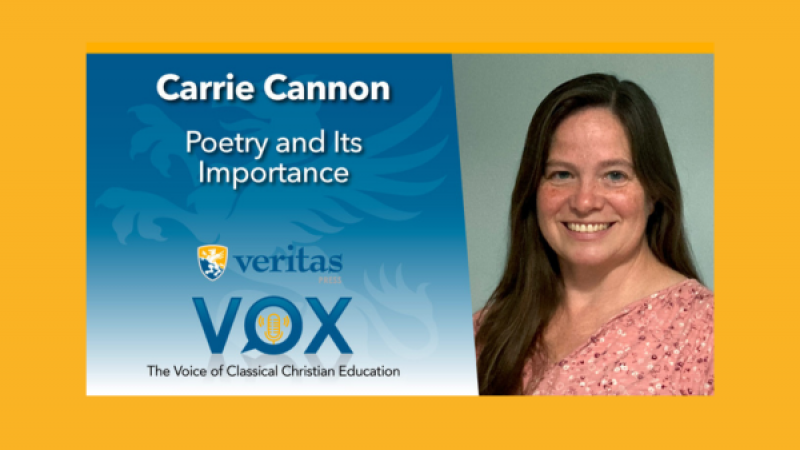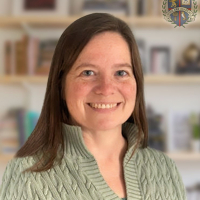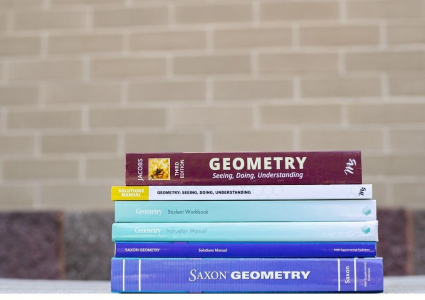Poetry and Its Importance | Carrie Cannon

Listen on Apple Podcasts | Listen on Spotify | Watch the Video
In our busy modern age, why spend time studying poetry? Today, Veritas Scholars Academy literature instructor, Carrie Cannon, joins us to explore how and why people of old used poetry, what qualities make a literary work a poem, and why poetry is still of value today.
Love the idea of letting your student flourish under an engaging instructor like Carrie Cannon? Whether you’d like to add a single course to your homeschool week or build out an entire school year of live online courses, we’re here for you! Tap here to set up a free call with a Veritas Family Consultant to explore what options are right for your family.
Episode Transcription
Note: This transcription may vary from the words used in the original episode for better readability.
Marlin Detweiler:
Hello again, and welcome to another episode of Veritas Vox, the voice of classical Christian education. Today we have with us someone who's quite familiar to the Veritas family, a teacher at Veritas, but also the wife of our headmaster, Dr. Bob Cannon. Welcome, Carrie Cannon.
Carrie Cannon:
Thank you.
Marlin Detweiler:
It's great to have you here. As you hear my introduction, you might think that this is about nepotism, and that's why she gets to be on Vox. But that's really not the case, as you will learn very quickly. Carrie has really established herself in a specific way that I'm pretty excited to talk about with her. But, Carrie, before we get into that, tell us a little bit about yourself, your family, which may be known to our community, but also what you've been up to, especially, in the last few years.
Carrie Cannon:
Okay. So yes, I am the wife of Dr. Bob, and we have seven children. The oldest is 24. The youngest is ten.
Marlin Detweiler:
That might change by the time somebody sees this!
Carrie Cannon:
That's true. But there's some changes for me this upcoming year, as I will only be home-educating three of our children. So I'm down to the minority home educating and I've spent 18 years home educating, and it's changed a lot because in the beginning, I was home-educating my oldest while taking care of toddlers and babies.
And now I'm able to focus on home-educating our children without having toddlers and babies. So it's really changed the way I educate our children. I know I leaned heavily on Veritas’s curriculum in the beginning years when especially my older kids hit high school. And so that was a real benefit to our family. And so it was about that time, I think, when my older kids hit high school, I had been a homeschool mom for basically 14 years, and I was feeling burned out.
And I was going for a walk with Bob, and he suggested I go back to college and finish my degree. And I thought that was pretty ridiculous.
Marlin Detweiler:
Yeah, you’re burnt out. So add to your work!
Carrie Cannon:
I have a nursing baby. I'm starting to homeschool high school, and he suggests going back to finish my degree. But I did, and I spent about five years finishing. Actually, my previous college experience had been in visual art, so I had taken courses at the college level in art. And so I went back because I realized that my real passion is literature. And so I went back and finished a bachelor's degree in literature.
Marlin Detweiler:
That's wonderful. And I heard a little bit about your courses. Most of the work, as I understand it, was online with Harvard University, for whom your degree was earned. That's pretty exciting. I, as you know, I like to tease Bob about him having gone to University of Pennsylvania and that that's the second tier Ivy League.
Of course, here I am talking from a guy that went to NC State- a state school, but that's become kind of an inside joke, but, it's the second tier because Harvard, Princeton, and Yale tend to be considered what I would think of anyway, as first tier. So congratulations on that. For those of you that have degrees from schools that are or Ivies that are listening, I'm sorry if that's insulting. I'm just having a little fun with it. Please don't take it too seriously.
But in recent years, I think at this point, as we record this, you're about to start your third year of an elective course called Poetry. Is that right?
Carrie Cannon:
Yeah. So when I completed my degree I was just talking with Bob about what I might do going forward because I found as a homeschool mom that I really needed that balance. I needed to be fed intellectually. And that really, I told you I was burned out, but having the challenge of my coursework, which was quite challenging, but having the conversation and being able to nourish myself with intellectual thought was making me stronger to be the homeschool mom that I needed to be, and I couldn't foresee how that could just end, and I could keep homeschooling. And so, I started teaching elective literature courses for Veritas. And I teach Poetry and Fairy Tales.
Marlin Detweiler:
That's wonderful. I'm glad you corrected me on that. I had forgotten that you were teaching Fairy Tales also. These are two areas not only in education but in, what I'll call appreciation by the typical American, the typical family. These are two areas that have kind of fallen on hard times in our lifetime. Why do you think that is?
Carrie Cannon:
Sure. So, with poetry, there has been a great cultural shift in understanding of what poetry is since the 20th century. I think, really, after the world wars.
Marlin Detweiler:
Do you think World War II was a turning point? World War I was a turning point for what was going on there, maybe in them collectively and a more gradual thing. Maybe it's not quite so precise as a watershed moment, but help us understand it.
Carrie Cannon:
Yeah. So what I've seen is in the 20th century, culturally, what was happening there was a deconstruction in the art world at large. I mean, I saw that as I was studying visual art as well. But in poetry specifically, there's this deconstruction of what is poetry and deconstruction of language. And so I feel that when I look at what is poetry, because that's a question that's often asked, what is poetry? How do you define poetry? And if you do a Google search of that today, you get from all reputable sites very different answers. And the definition of poetry since the 20th century changed from what it had previously been since its inception around 600, the common era.
Marlin Detweiler:
We don't use the term common era.
Carrie Cannon:
So Bob and I had this argument a lot. I use that term because of my experience at Harvard. Like Paul, how he wants to be all things to all people. I feel that that helped me to engage in conversation and meeting the academics where they were. So I'll try to switch over.
Marlin Detweiler:
I can understand that a professor might have expected it, but not today. I have a different expectation. So you can meet mine instead of theirs!
Carrie Cannon:
So from the sixth century AD, the inception of English poetry was understood to be a certain thing. And if you had asked someone way back then, you know, why is poetry important? They wouldn't necessarily have even understood the question, because it was such a part of their culture. And that poet, that definition of poetry remained the same for 1500 years.
Marlin Detweiler:
What would be a good, succinct definition that we might see before the 20th century?
Carrie Cannon:
Right. I'll tell you what I tell my students when they're writing poetry. And again, I'm not looking at poetry from the 20th century onward. I'm looking backward at what was poetry understood to be historically English poetry for 1500 years. And that is number one because it is a tool of communication. It follows grammatical rules because sentences are the way our words make sense to us.
And so if we want to make sense in communicating to other people, we need to use all the sentences. But what's different about poetry and prose is that poetry has always been an oral art form. And so it has sound patterns and that might be rhyme. It wasn't always rhyme. It can be meter, or rhythm, but sound patterns are an important aspect of poetry and then figurative language.
So if you keep those three things together and look over the 1500 years from its inception, you can see that this is a rough description of what is poetry.
Marlin Detweiler:
So that would be the case until we see things changing in the 20th century, where would we find ourselves today? But in what would be a generally accepted definition of poetry?
Carrie Cannon:
It's difficult to say, so I'll just tell this quick story. When I was in art school the first year, one of my professors asked, there is a classroom of about 30 students and said, “Does anybody believe in absolutes?” And I was the only student that raised my hand out of 30 students. I was shocked, I thought I might be a minority, but I was the only one.
Marlin Detweiler:
Therein lies a logical conundrum that it's obvious to some of us, and maybe not all of us, but it's worth noting. And that is if somebody says, “I don't believe in absolutes,” the logical conundrum is that they just made an absolute.
Carrie Cannon:
Right, definitely. So how I responded because I'm with a bunch of artists and I said, okay, if you don't believe in absolute, then that means that art is not an absolute and anything is art, which means anyone is an artist, everyone is an artist. And honestly, that didn't bother anybody there. And that's where visual art has gone. Anything is art, and anyone can be an artist. It's just whatever you hang on the wall. And poetry has followed that same progress where anything is poetry now.
Marlin Detweiler:
Modernism and postmodernism’s influences.
Carrie Cannon:
Right, yes. So it's difficult to pin down, you know, what is the definition of poetry today? Because it depends on who you ask.
Marlin Detweiler:
Yeah. I understand it. If I went to a coffee shop reading of poetry, which would maybe be the best example, it might be more appropriate to say on a college campus. But, I would hear people reading things or saying things with, would meter and the sound of it being spoken, not have some even informal general acceptance at that point?
Carrie Cannon:
It can. And, I honestly think that the pendulum may be swinging back that direction.
Marlin Detweiler:
When things lose complete meaning and complete definition, they become everything for everybody, right? Tends to be the end of the road. And somebody says, “No I want it to mean something.”
Carrie Cannon:
Right. So I'm seeing a movement of poets moving back towards some formal definition and boundaries of what is poetry. But again, it really depends on who you ask, because I also did an undergraduate research project for a professor, and one of the things I was researching was sound poetry, in which you might go to this coffee shop and hear this poet, you're told, come hear this poet, they're going to recite their poetry, and they stand up, and they're just making noises with their mouth. There's no words. There's not really any meaning. There's just noises. And so that would be considered poetry by many today.
Marlin Detweiler:
Yeah, that's pretty bizarre. Well, let's move on. The classes that you teach have really started to gain traction because we – parents and administrators etc., have seen the exciting things of thinking about poetry in a historical sense. So that our listeners understand we're not adopting a modernist or postmodern definition of poetry, we're taking that classic historical definition and applying it to our academic pursuits. And you mentioned, you didn't mention it here– from a prior conversation that the other thing that disappeared is the overwhelming Christian influence in poetry.
Carrie Cannon:
Right.
Marlin Detweiler:
Let me let me ask a question about that. Sorry. What is it? Is that is the post-Christian element that we're dealing with connected to that? And how if you can, identify.
Carrie Cannon:
Yes. So as I'm seeing the pendulum possibly beginning to swing back and at the same time as I was researching for teaching this course and realizing this, what in my undergraduate work at a secular school, I didn't really see the strong thread of Christianity running through English poetry and how that was such an influence on poetry. And what is poetry and how poetry developed over time historically, English poetry.
And so it's my idea that as Christians return back to looking at those poets from history, that they should be the ones again, it should be through Christianity that poetry is reborn, I guess, is what I'm trying to say.
Marlin Detweiler:
But there's a lot of acceptance to that by our parents and students. Talk to us about the class objectives and how those play out in efforts to – well, I'll say rebirth, an interest in poetry and why that's so important.
Carrie Cannon:
So, I do hope that I inspire the next generation of poets, Christian poets specifically. So that is one of my desires. But my objective for the class is that for all of the students that I would incite in them a lifelong habit of reading poetry. So whether or not they're going to become a poet and write poetry, we do some of both in the class. We read poetry, we write poetry, and we recite poetry, which is also a lost art form.
Marlin Detweiler:
Does recite mean memorize and then speak it?
Carrie Cannon:
Exactly. And then to present. It used to be a common part of your education for centuries, and it seems to not, just even just memorizing information and having to then present it isn't as common today as it was. So trying to bring back reciting poetry and reading poetry aloud is very important because, again, it was an oral art form.
And then when it became written, it still retained a lot of its oral features, but some of it is became lost. And then as people weren't reciting poetry anymore, you know, then you can see how it's all starting to sort of crumble down. And so as a teacher, I really want to as I said, I hope that some of my students will go on and become poets, but I hope that all of my students will just make it a lifelong habit to to continue engaging with poetry, reading poetry, because I think that's where it would need to start.
Marlin Detweiler:
Yeah, we didn't talk really at all, although there's a sense in which it's a first cousin, and a lot of things are related. But how does the teaching of fairy tales, look in comparison, both to what you're doing in poetry and how fairy tales have been regarded over time?
Carrie Cannon:
It's been really interesting because as I've been preparing for both of these courses, I think they keep overlapping these. And, and I'll see the same authors overlapping. And actually, this summer, some of my students from both classes said they wanted to do a book club over the summer just for fun with me. So I've been doing it.
Marlin Detweiler:
That's great! Let me just pause parenthetically here for a moment and say, that's the kind of thing that gets me up in the morning to hear that our teachers, that the people that work at Veritas are so committed to the work and the ministry that they do things that we don't even know about, that are just further enhancing what we care about. Thank you.
Carrie Cannon:
Sure. Yeah. So it's been delightful. I've been enjoying meeting with them. They really pushed it. The whole thing was their idea. And I even said to them I tried to talk them out of it. I said, you're going to finish this school year. Some of them are graduating as like, you're going to college, you're setting sights. It's like, you don't want to come back and talk about poetry with me this summer.
And they said, no, they were like, we want to keep doing what we do in class every day, but without grades, wouldn't that be wonderful? But that's what we've been doing. So I had students from both classes, poetry and fairy tales all together. And at first I thought, well, what are we going to read?
And I wanted to pick something that would appeal to both audiences. And I discovered it's not difficult at all that there's so much overlap between fairy tales and poetry studies. I've just been astonished at the overlap, so that's been fun to find.
Marlin Detweiler:
Give us a definition of the category that we call fairy tales.
Carrie Cannon:
Okay, so fairy tales, you have folklore, which tends to be stories that have been passed down orally over time. Sometimes they may have originated as a written story. And then, so we have what's called secondary orality, which is cultures where, they're hearing read stories. So like, the majority of the culture isn't literate, but there's some people in the culture who are literate.
And so sometimes you have, you know, like a Greek written story. So our Beauty and the Beast tale we think comes from the Cupid and Psyche story originally wasn’t written down, but then that was told orally to people who couldn't read. And so then the story starts to morph and change and the fairy tales I'm going to.
Marlin Detweiler:
But I will if I may. Beauty and the Beast would be more relatable to many people than Cupid and Psyche, who may not have a background in Greek mythology.
Carrie Cannon:
Right. So the Beauty and the Beast tale that we think of today is mostly from a French tradition from the 17th century. So it's much closer in time. So there's themes that are more relatable to us. Definitely. But so that's folklore, you know, these oral tales that have been told whether they originated as a written tale or not.
They've been these oral tools that have tales that have been told. What makes it a fairy tale is not that there's fairies in the story, because so many of our fairy tales, in fact, most of, if not all of Grimm's Fairy Tales, don't have any fairies in them at all, but that they take place. And this is from J.R.R. Tolkien. He wrote this wonderful essay on fairy stories, and so he actually didn't write it. He wrote it down afterwards. It was a lecture that he gave at Saint Andrews University. So he says, what makes it a fairy tale is that it takes place in fairy, as in the land of fairy. So basically there's some sort of magical element in the tale.
That's what differentiates a fairy tale from folklore.
Marlin Detweiler:
So it would not necessarily be a fairy tale, of course, would not have a rhythmic element like poetry in its classic definition. It would be longer, it would be written or spoken, but it would be more narrative than it would be with some sort of cadence or something about hearing it that would be significant.
Carrie Cannon:
So that's where there's a lot of overlap. So one of the books that I read in the book club was The Lais of Marie de France, who was a medieval woman in England. And she was writing these poems in like an early version of, like an Anglo-Norman language. And a lot of them are fairy tales, but they're also poems.
And so there's definitely an overlap, because I think also today, even through the 19th century, like if you think of Henry Wadsworth Longfellow and the Midnight Ride of Paul Revere, there was more a tradition of narrative poetry. So, I mean, go all the way back to Homer. That's narrative poetry, poetry that tells a story. But with the Romantics starting at the end of the 19th century, they were really breaking away from that and writing more lyric poetry, which is what we think of, I think today, if I say poetry, I think that's what people think of.
They think of lyric poetry. So if you're looking at all of a greater definition of poetry, narrative poetry included, you're going to find fairytales that are written as poems.
Marlin Detweiler:
So now the big question, because this is a question that kids like to ask, why does this stuff matter?
Carrie Cannon:
Okay. So, I’ll answer the question for poetry, but I just remembered one more thing about fairy tales and their overlap with poetry. The first book that I use, the first text that they use for the fairy tale class is prose fairy tales, which are the French fairy tales from the 17th century and his first publication of fairy tales were all poems. I kind of just realized that because I just teach them as narrative, I don't teach them as poems, but he wrote them all as poems. There's 4 or 5, narrative poems. And there for the fairy tales.
So why does poetry matter? There's many reasons, but I'll focus on two if we have time for two that are most important to me.
And the first one is that poetry connects us to God. And we see a wonderful example of that in the Bible, and that is the Bible we think of as God's Word to us. But the Psalms are written almost completely in the first person. And so the Psalms are really our words to God. And that's poetry in, you know, from the Hebrew tradition, we see that poetry is the form of literature that's connecting us to God. You know, it's our words to him. And then you can trace that with Homer's poetry. For instance, in the Greek tradition, when they were reciting these poems, they would, someone to recite the poems at their different feasts and festivals. They would get together. And it was a religious ritual. It wasn't just to remember the story.
It wasn't just to remember the battles that happened or the heroes. It was specifically to connect them to their gods. They believed there was this invisible link from the gods to the poet to the people, and they didn't have an opportunity for, salvation like we do. And so any opportunity that they could link somehow with immortality and their poetry did that for them.
English poetry. I've talked about when English poetry began our first English poet that we know by name is Cadman. And Bede tells this story in his history of the English Church. And it is through a miracle that Cadman is given the ability to create a poem. His poem is the first English poem that we have, and we have it.
Bede's manuscript is in Latin. In a couple manuscript versions, some scribes have written the Old English words of Cadman's poem. So our first written English poem is it's not long, it's maybe 8 to 10 lines, and it's simply epithets of God as creator praising him. That's our first English poem. That to me is so exciting. So again, you know that poetry is our way of linking to God. It's a language, almost, that God seems to have given to us to be able to communicate with him.
And then my second reason why poetry is important is that poets are, our word builders. So, you know, in the VSA culture, I think fantasy literature is really, really loved. Until we have Tolkien and Lewis and they were world builders, right? They built Narnia. And everyone loves that. But poets are word builders. They're the ones who are creating our language. And so back to where we started in the 20th century, the poets start deconstructing and our language is deconstructing. But poets are the ones historically who built language. They weren't just writing poetry to say, look at how masterful I am with language.
But they were writing poetry to show, look at the possibilities of what you can do with the English language. Look what English can do as a language. Look at what it can express.
Marlin Detweiler:
Yeah. And I think that's wonderful. What difference does it make? And maybe it is more a consequence rather than a cause. And if it's a consequence, then the difference is found in the cause that maybe may be different, but what difference does it make that the definition of poetry has degraded in such a way in, really our lifetime and slightly before?
Carrie Cannon:
I think that really just touches back to the themes that we've already talked about, that, if we're losing the definition of poetry, then we lose poetry as an art form and we lose the importance of poetry. Poetry used to be a part of people's everyday lives. So during the Anglo-Saxon culture, poetry was their storytelling, but it was their way of remembering.
And so it was important for remembering historic events, remembering genealogies. And so it had a great significance. But even if you go back to the 19th century, poetry was a part of every person's daily reading in their newspaper. It was a part of your education. We talked about the importance of reciting poetry. It was any time a people assembled, whether it was for church or for any type of event, poetry was read and performed.
And we've completely lost that as a culture. So we have the upcoming– I won't get into politics because I'm not. That's not my field. But there's this very interesting. I tell this to my students because, again, I'm hoping to motivate one of them, at least to become a poet. Right. But, so with our inaugurations since JFK, he had a poet speak at the inauguration. And since then, it's only been Democratic presidents who have had poets speak at the inauguration.
Marlin Detweiler:
So it seems to me, from what you're saying, that a loss of poetry has been the case in some senses for our entire existence, that is, the people that now live. And so we have some need to recover this and understand from things that we didn't get from our parents and didn't experience ourselves. But it seems like a loss of poetry is somewhat a loss of what it means to be human and God's creation.
Carrie Cannon:
That's really insightful. And it's definitely a loss of a part of the language and art form that he gave us. And so I hadn't really thought of it as that, but as, you know, wanting to hold on to, you know, were created in his image and the fullness of him to not lose that art form.
Marlin Detweiler:
Yeah. Well, this has been great, Carrie. Thank you so much for joining us today. Great to have you.
Carrie Cannon:
Thank you!
Marlin Detweiler:
Folks, thank you again for joining us on another episode of Veritas. Vox The Voice in Classical Christian Education. We look forward to seeing you next time.







